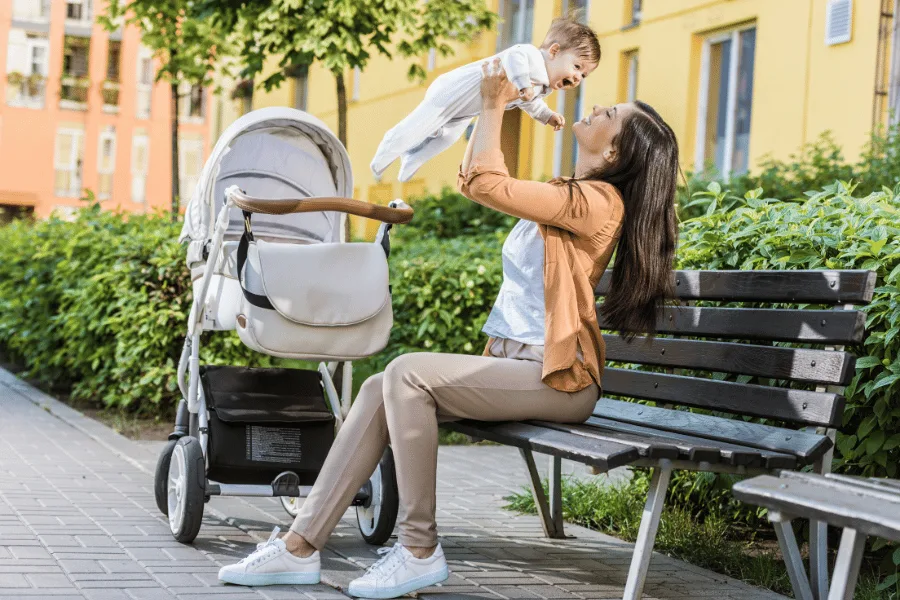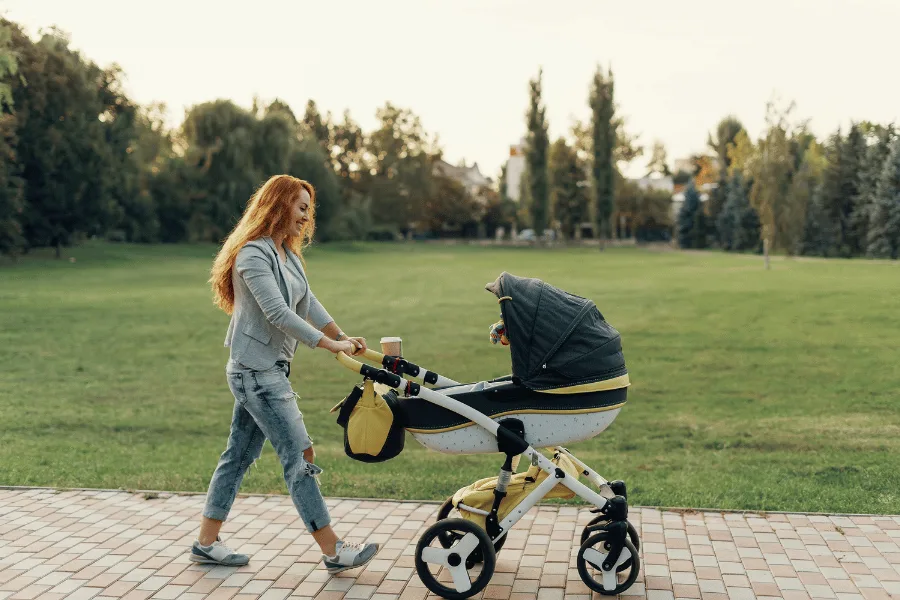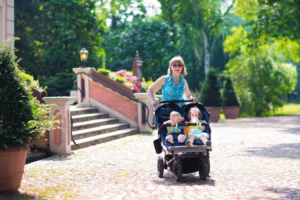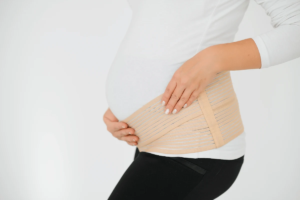
Choosing the right stroller is a pivotal decision for parents, especially those who are always on the move. Lightweight strollers have grown in popularity because they combine portability, convenience, and ease of use without compromising the comfort and safety of the child. While a traditional stroller can weigh over 25–30 pounds, lightweight strollers typically range between 10–20 pounds, making them easier to carry, fold, and store. However, the weight alone doesn’t define a good lightweight stroller; comfort, durability, and functionality play equally important roles. In this article, we’ll explore the features, materials, and design elements that make a lightweight stroller both light and comfortable, giving parents all the information they need to make an informed choice.
Understanding Lightweight Strollers
Lightweight strollers are designed for parents who value convenience and portability. They are ideal for urban living, travel, and everyday errands, where a full-size stroller might be cumbersome. These strollers allow parents to move quickly and efficiently without struggling with heavy or bulky equipment. Many models are engineered for easy one-hand folding and lifting, making them perfect for commuters or travelers who frequently navigate stairs, public transport, or tight spaces, just the kind of parenting deals that make life easier.
Key benefits of lightweight strollers include:
- Portability: Easy to carry up stairs, into cars, or on public transportation. Many models also feature shoulder straps or carry handles for effortless transport.
- Compact Design: Folds quickly to save storage space and fits into car trunks or closets without taking up much room.
- Ease of Maneuverability: Often designed with swivel wheels for smooth navigation through crowded streets or tight spaces, while some premium models include lockable front wheels for stability on uneven surfaces.
While they are smaller and lighter, modern lightweight strollers can still offer advanced features that were once exclusive to full-size strollers, such as reclining seats, suspension systems, storage baskets, and adjustable canopies, providing both convenience and comfort for parents and children alike.
Features That Make a Lightweight Stroller Comfortable
1. Reclining Seats
Comfort starts with the seating. A good lightweight stroller should offer multiple reclining positions, allowing a child to sit upright while observing surroundings or lean back for a nap. Some models even offer nearly flat reclines suitable for newborns, giving parents a flexible option as their child grows.
2. Padding and Ergonomics
High-quality padding supports the child’s posture and prevents discomfort during longer outings. Ergonomic seating design ensures that children are seated in a natural, supported position, reducing strain on their back and legs. Advanced models also include removable cushions for easy cleaning.
3. Adjustable Leg Rests
Children’s legs need proper support, especially during naps or longer rides. Adjustable leg rests allow parents to customize the stroller to their child’s height, improving comfort and circulation. For toddlers, leg rests also help them sit comfortably while exploring the surroundings.
4. Sun Canopy
Extendable sun canopies shield children from UV rays and provide shade during hot days. Many modern lightweight strollers include UV-protective fabric and multiple canopy positions. Some models also have peek-a-boo windows so parents can easily check on the child.
5. Suspension Systems
While lightweight strollers are generally designed for smooth urban surfaces, a quality suspension system absorbs minor bumps and uneven pavements, ensuring a smoother ride for children. Advanced suspension systems can make city walks, park paths, or light off-road terrain more comfortable.
6. Maneuverability
Swivel front wheels, lockable for stability, are a common feature in lightweight strollers. This enhances maneuverability in tight spaces and makes the stroller easier to steer with one hand. Some premium models offer quick-lock systems, making wheel adjustments seamless.
Materials That Keep the Stroller Light
The construction materials play a critical role in reducing weight while maintaining durability:
- Aluminum Frames: Strong yet lightweight, aluminum is the most common frame material. It offers durability without increasing stroller weight.
- High-Density Foam Padding: Provides comfort without adding excessive weight, perfect for prolonged use.
- Mesh Fabric Seats: Breathable and lightweight, improving airflow and preventing overheating in warm weather.
- Plastic and Lightweight Rubber Wheels: Reduce overall weight while ensuring mobility. High-quality wheels can resist wear and provide stability on uneven surfaces.
- Reinforced Nylon Fabrics: Often used in storage compartments and seat materials to balance strength, durability, and lightness.
Advanced materials allow manufacturers to reduce weight while maintaining performance, ensuring that both parent and child have a comfortable experience.
Types of Lightweight Strollers
There are several types of lightweight strollers designed for different lifestyles:
| Type | Weight Range | Key Features | Best For |
| Umbrella Strollers | 10–15 lbs | Folds compactly, minimal padding | Quick errands, travel |
| Travel Strollers | 12–18 lbs | Reclining seats, storage options | Airports, public transport |
| Jogging Strollers (Light) | 18–20 lbs | Fixed front wheel, suspension | Brisk walking, active parents |
| Convertible Lightweight | 15–20 lbs | Adjustable seat and recline | Growing children, multiple uses |
Additional Comfort Features
Parents often overlook small comfort-oriented features that make a big difference:
- Cup Holders & Snack Trays: Keep beverages and snacks within reach for parent and child.
- Storage Baskets: Essential for carrying diapers, toys, or groceries.
- Weather Accessories: Rain covers and footmuffs protect the child during inclement weather.
- Handlebar Height Adjustments: Allows parents of varying heights to push comfortably without straining their backs.
- One-Hand Folding Mechanism: Offers convenience, especially when juggling bags or other children.
Expert Insights
Parenting experts and stroller reviewers emphasize that a lightweight stroller must be evaluated not just for weight but also for usability, comfort, and safety.
- Joan Muratore, a parenting expert, states: “A lightweight stroller should be light enough to lift, but still sturdy enough to ensure the child is comfortable and safe during everyday use.”
- Reviews from real-world testing highlight that strollers like Babyzen YOYO2 and UPPAbaby MINU V2 strike a perfect balance between portability and comfort, making them favorites for urban parents and frequent travelers.
- Pediatricians also emphasize that ergonomic support and adjustable seating in lightweight strollers are crucial to prevent posture issues during prolonged use.
Choosing the Right Lightweight Stroller
When selecting a stroller, consider your lifestyle and needs:
- City Living: Prioritize compact folding, one-hand operation, and smooth maneuverability.
- Frequent Travel: Look for travel-approved sizes, airline-approved folding, and light carry weight.
- Comfort-Focused: Ensure adequate padding, adjustable recline, leg rests, and canopy coverage.
- Longevity: Consider strollers that grow with your child, offering multiple seating positions or adaptability for toddlers.
- Budget Considerations: Premium lightweight strollers offer advanced features, while budget-friendly models provide essential portability without unnecessary extras.
Safety Considerations
A stroller’s light weight should never compromise safety. Always check for:
- Five-Point Harness Systems: Secure children during rides.
- Brake Systems: Reliable and easy to operate, ensuring stability when parked.
- Lockable Wheels: Provides stability on uneven surfaces.
- Durable Frame Construction: Ensures long-term durability without adding excess weight.
- Certification and Standards: Look for strollers tested according to ASTM or JPMA standards for safety assurance.
Long-Term Benefits of a Lightweight Stroller
- Ease of Transportation: Parents can carry, lift, and store the stroller without strain.
- Encourages Outdoor Activities: Convenience increases the likelihood of daily walks and outdoor outings.
- Child Comfort: Ergonomic design and suspension prevent discomfort on longer trips.
- Reduced Fatigue: Lightweight designs reduce the physical strain on parents during travel or errands.
- Versatility: Adaptable for various terrains, travel scenarios, and child ages, ensuring lasting usability.
- Time Efficiency: Quick folding and storage save time, especially when commuting or traveling.
Top Lightweight Stroller Models
| Model | Weight | Reclining Seat | Canopy | Price Range |
| Babyzen YOYO2 | 13.6 lbs | Yes | Extendable | $500–$600 |
| UPPAbaby MINU V2 | 14.8 lbs | Yes | Extendable | $400–$500 |
| Joolz Aer | 13.4 lbs | Yes | Extendable | $500–$600 |
| Nuna TRVL | 13.6 lbs | Yes | Extendable | $500–$600 |
| Bugaboo Butterfly | 16.1 lbs | Yes | Extendable | $600–$700 |
FAQs
What is the average weight of a lightweight stroller?
Lightweight strollers typically weigh between 10–20 pounds, making them easy to carry and maneuver.
Are lightweight strollers suitable for rough terrain?
They are best suited for smooth surfaces, but some models have suspension systems to handle minor bumps.
Can a lightweight stroller be used for jogging?
Most are not designed for jogging, though some can handle brisk walks or light jogging.
How do I maintain a lightweight stroller?
Clean regularly, check for loose parts, and ensure wheels are functioning properly for longevity.
What are the benefits of a lightweight stroller?
They provide portability, ease of maneuvering, and convenience, perfect for travel and daily errands.

Conclusion
Lightweight strollers offer the perfect combination of portability, comfort, and convenience. While their primary appeal lies in reduced weight, comfort features such as padded seats, adjustable reclines, sun canopies, and suspension systems ensure that children enjoy a safe and pleasant ride. By carefully considering your lifestyle, travel habits, and child’s needs, you can select a lightweight stroller that enhances both your mobility and your child’s comfort.



